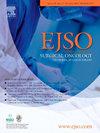什么时候手术是无效的?对晚期胃肠癌手术治疗中相互矛盾的定义和模式的系统回顾
IF 2.9
2区 医学
Q2 ONCOLOGY
引用次数: 0
摘要
目的报道晚期胃肠道(GI)肿瘤手术无效的定义和无效率。手术仍然是晚期胃肠道癌患者的主要治疗选择,手术成功后生存率显著提高。然而,未能达到预期的手术可能被视为“徒劳”。尽管无效的临床和伦理重要性,但在这个队列中没有普遍接受的无效定义。方法按照PRISMA指南,于2024年9月26日检索medline、CINAHL、Scopus、Embase、Cochrane Register和Web of Science。研究涉及晚期消化道肿瘤的治愈性手术。两位独立作者提取了研究特征、无效定义和比率。使用JBI关键评估清单评估偏倚风险。结果共纳入23项研究(74 839例)。肝癌(n = 10)和结直肠癌(n = 7)是研究最多的队列。无效的定义差异很大,大致分为复发(n = 12.52 %)、死亡(n = 5.21 %)或两者兼而有之(n = 5.21 %),时间范围不同。无论定义如何,平均不孕率为27.3%,其中胰腺癌报告的比率最高(31.9%)。一项研究定性地定义了徒劳(弊大于利)。值得注意的是,没有研究纳入患者对无效的看法。结论晚期胃肠道恶性肿瘤手术无效定义存在显著的异质性,限制了其推广。缺乏病人的观点是一个关键的缺口。未来的研究应优先发展一个共识定义,包括不同利益相关者的观点,以改善临床决策和以患者为中心的护理。本文章由计算机程序翻译,如有差异,请以英文原文为准。
When is surgery futile? A systematic review of conflicting definitions and patterns in surgical care for advanced gastrointestinal cancer
Objective
To report current definitions of futility and futility rates for patients undergoing advanced gastrointestinal (GI) cancer surgery.
Background
Surgery remains the primary treatment option for selected patients with advanced GI cancer, demonstrating significant survival benefits when successful. However, surgeries that fall short of expectations may be viewed as ‘futile’. Despite the clinical and ethical importance of futility, no universally accepted definition of futility exists in this cohort.
Methods
MEDLINE, CINAHL, Scopus, Embase, Cochrane Register, and Web of Science were searched on 26 September, 2024, adhering to PRISMA guidelines. Studies involving curative intent surgery for advanced GI cancers were included. Two independent authors extracted study characteristics, futility definitions and rates. Risk of bias was assessed using the JBI Critical Appraisal Checklist.
Results
23 studies were included (74 839 patients). Liver cancer (n = 10) and colorectal cancer (n = 7) were the most studied cohorts. Definitions of futility varied widely, and were broadly categorised into recurrence (n = 12, 52 %), mortality (n = 5, 21 %), or both (n = 5, 21 %), with heterogeneous timeframes. Irrespective of definition, the average futility rate was 27.3 %, with pancreatic cancer reporting the highest rate (31.9 %). One study defined futility qualitatively (harm outweighing benefit). Notably, no studies incorporated patient perspectives on futility.
Conclusion
Significant heterogeneity exists in futility definitions for advanced GI malignancy surgery, limiting generalizability. The lack of patient perspectives represents a critical gap. Future research should prioritize developing a consensus definition that includes diverse stakeholder viewpoints to improve clinical decision-making and patient-centred care.
求助全文
通过发布文献求助,成功后即可免费获取论文全文。
去求助
来源期刊

Ejso
医学-外科
CiteScore
6.40
自引率
2.60%
发文量
1148
审稿时长
41 days
期刊介绍:
JSO - European Journal of Surgical Oncology ("the Journal of Cancer Surgery") is the Official Journal of the European Society of Surgical Oncology and BASO ~ the Association for Cancer Surgery.
The EJSO aims to advance surgical oncology research and practice through the publication of original research articles, review articles, editorials, debates and correspondence.
 求助内容:
求助内容: 应助结果提醒方式:
应助结果提醒方式:


